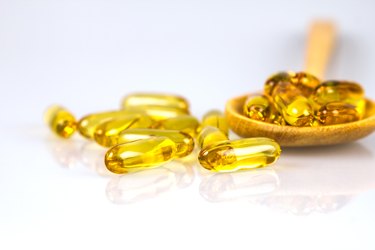
Trying to understand the sundry studies of vitamins can make anyone's head spin. But according to the Harvard School of Public Health, the message is simple: Taking vitamins and supplements can be an easy way for you to get your essential nutrients, especially the ones that are lacking in most foods. There is no evidence to suggest that taking vitamin D-3 and folic acid together has any special benefits or risks. But because each vitamin is essential for your health, it is a good idea to get both of them daily, whether you take them together or separately.
Interactions
Video of the Day
Folic acid helps to prevent spina bifida in newborns, and it may lower the risk of heart disease and certain cancers. Vitamin D-3 can treat depression and possibly lower the risk of many cancers, as well.
Video of the Day
Vitamin D-3 and folic acid don't interact negatively with each other, according to the website Drugs.com. And taking them together doesn't seem to have any special benefits. Each, however, is good for you. Before you start taking them regularly, talk with your physician. You may have a special condition or you may be on medications that need to be monitored.
Vitamin D-3
Vitamin D-3 is a fat-soluble vitamin that's naturally present in very few foods. It is often added to foods or taken as a supplement. An interesting and important fact about vitamin D-3 is that it is also produced when ultraviolet rays from sunlight strike the skin.
Vitamin D-3, which is converted to cholecalciferol after it is consumed, has numerous functions, according to the National Institutes of Health. It controls phosphorus, calcium and bone metabolism, as well as neuromuscular function. Vitamin D-3 promotes calcium absorption and maintains serum calcium and phosphate concentrations to enable bone mineralization, which can prevent osteoporosis and other bone disease.
Vitamin D-3 deficiency can have a major effect on your bones, causing brittleness and weakness. Overall, vitamin D-3 deficiency is known as rickets in children and osteomalacia in adults.
Folic Acid
Folic acid is the supplemental form of folate, which is a water-soluble B vitamin that is easily available in food. According to the National Institutes of Health, folic acid is a key nutrient needed to prevent anemia in pregnancy. Folic acid helps to produce and maintain new cells, which is especially important during the periods of rapid cell growth that fetuses and infants undergo. Folate is crucial in the formation DNA and RNA and helps to prevent changes to DNA that may lead to cancer. Folic acid is also essential for the function of many amino acids.
In Tandem
Overall, vitamin D-3 and folic acid have numerous health benefits. It's especially important to get both of these vitamins during pregnancy. Vitamin D-3 aids in bone formation, and folic acid can help prevent birth defects. Those who are older also need both of these vitamins, because vitamin D-3 synthesis in skin weakens with age, and folic acid may prevent Alzheimer's disease, according to the Linus Pauling Institute.
But it's a good idea to avoid taking more than the recommended amounts of these two vitamins. Consult with your doctor to determine how much of each you should be taking daily.
- Harvard School of Public Health: Vitamins
- National Health Institutes, Office of Dietary Supplements: Vitamin D Fact Sheet
- National Health Institutes, Office of Dietary Supplements: Folate Fact Sheet
- Drug Information Online: Interactions
- "Journal of Orthomolecular Medicine"; Folic Acid, Vitamin D and Prehistoric Polymorphisms in the Modern Environment; Challem, Jack; Vol. 20, No. 1, 2005
- Food and Drug Adminstration: Drug Interactions
- Oregon State; Linus Pauling Institute Research Report: What to Look for in a Multivitamin Supplement